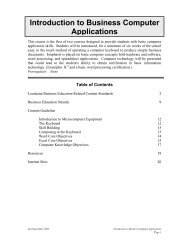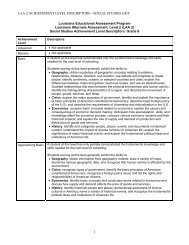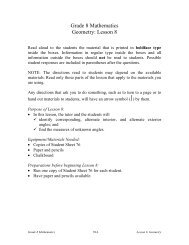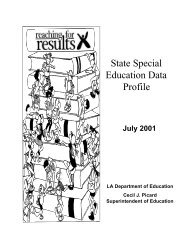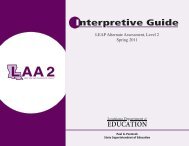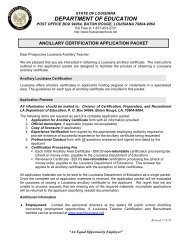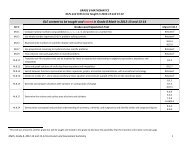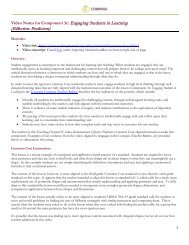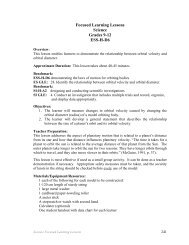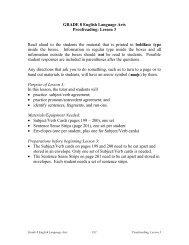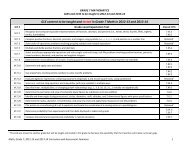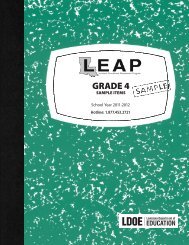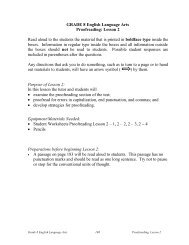School Improvement - Louisiana Department of Education
School Improvement - Louisiana Department of Education
School Improvement - Louisiana Department of Education
Create successful ePaper yourself
Turn your PDF publications into a flip-book with our unique Google optimized e-Paper software.
Guidelines for Judging the Quality <strong>of</strong> a Study<br />
The criteria for judging the quality <strong>of</strong> research studies are contained in the definition <strong>of</strong> scientifically based<br />
research in section 9101 (37) <strong>of</strong> the reauthorized Elementary and Secondary <strong>Education</strong> Act (ESEA). Although there<br />
is no universally accepted standard, for the purpose <strong>of</strong> this publication, a high quality study meets all <strong>of</strong> the criteria<br />
described below. A reasonable quality study meets all but one <strong>of</strong> the criteria. For example, a reasonable quality<br />
study might be systematic, empirical and use rigorous data analysis on reliable and valid data, but it might use a<br />
longitudinal study design that does not involve random assignment to study groups or statistical controls on<br />
background characteristics.<br />
Criterion 1: Systematic and Empirical<br />
High quality research is carried out in a manner that is consistent, disciplined, and methodical, not sloppy or<br />
haphazard. Such research shows evidence <strong>of</strong> careful planning and keen attention to detail. Empirical research is<br />
grounded in data drawn from observation or experiment; the claims being made are supported by measurable<br />
evidence, not opinion or speculation.<br />
When evaluating research, consider the following:<br />
• Does the research have a sound theoretical foundation?<br />
• (See Research Consumer Questions, p. 134)<br />
• Were the data obtained using observation or experimentation?<br />
• Were the data collected from all appropriate groups <strong>of</strong> respondents and not just from certain groups?<br />
For example, does a school reform practice that claims to benefit all students include special education<br />
students in its research? If the research uses test results for a given school, did all <strong>of</strong> the students in the<br />
school take the test?<br />
• Were the data observed or collected from multiple subjects (teachers, students, schools, etc.)?<br />
• Are the research findings supported by measurable evidence?<br />
Criterion 2: Rigorous Data Analysis<br />
Even the highest quality data are <strong>of</strong> little value unless analyzed thoughtfully and carefully. The definition <strong>of</strong><br />
scientifically based research requires that data collected must be analyzed using methods that are appropriate for<br />
the task, and adequate to test the stated hypotheses and justify the general conclusions drawn. Failure to apply<br />
appropriate methods could produce inaccurate or misleading findings.<br />
Some key questions to consider about the data analysis include the following:<br />
Does the research test the stated hypothesis, and do the findings justify the general conclusions drawn?<br />
Does the research report the sample size and the statistical procedures used?<br />
Do the researchers analyze the data in a manner appropriate to the research question <strong>of</strong> interest? Are the<br />
statistical procedures used adequate for answering the research question?<br />
Do the analysis methods correspond to the structure <strong>of</strong> the data? Does the analysis account for the complexities<br />
<strong>of</strong> the data? For missing data? For unique groupings? For changes in the data over time?<br />
For example, in school research studies that unfold over time, subjects may drop out <strong>of</strong> the study (for example, by<br />
moving out <strong>of</strong> a study school). Adequate data analyses address these issues.<br />
137



